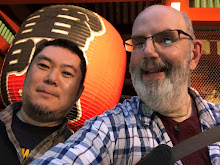iti, huzi, ni, taka, san, nasu, yon, ougi, go, tabako, roku, zatou
the six lucky items that should appear in your first dream of the new year: Mt Fuji, hawks, eggplant, folding fans, tobacco, blind monks
it was actually another foreigner in Japan, my friend Doug, who introduced me to the 'first dream' notion. the Japanese ask one another what they saw in their first dream of each New Year, and according to tradition, there are six lucky items that can appear.
the first of those is Mount Fuji. a traditional (Edo-period) symbol of Japan itself.
the second is hawks, predator birds that fly high and were also kept as pets by the samurai aristocracy, hence a symbol of wealth.
the third is eggplant. huh? some say that because eggplant are grown (famously) in the region from which the Edo-period shoguns (the Tokugawa family) arose, Suruga, in Shizuoka, that the inclusion of eggplant was just a nod to those in power. however, eggplants also figure as aphrodisiacs and/or allegorical representations of (male) sexual prowess (remember: Japanese eggplants are longer and thinner than those sold in North America). as an aside, chestnuts were also considered in a similar light, because the smell of their flowers in bloom is highly suggestive of the smell of male ejaculate. I think that eggplants made the list for the latter reason. the Japanese (in the Edo-period as well as today) are not known for Puritan values. sex is up there on everyone's wish list.
the fourth, folding fans, is indicative of dancers, particularly geisha, who used fans in their act. since geisha could only be afforded (as entertainers, which is what they were/are, not prostitutes) by the wealthy, again this is a portent of money.
the fifth is tobacco, which was then a status symbol. since it was imported (by the Dutch, to Dejima, the island they were allowed to use in Nagasaki), it was expensive.
the sixth, blind monks, is a bit harder to fathom, but the suggestion is that since such monks were often itinerant and were usually musicians as well, playing either the biwa, a lute descended from the Chinese pipa, or the shakuhachi, a vertically-played flute.
Friday, January 30, 2009
Subscribe to:
Post Comments (Atom)

No comments:
Post a Comment